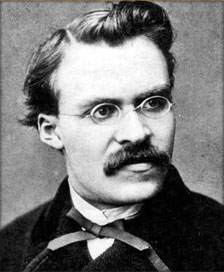The original text contains a great deal of word-play. For instance, words beginning with über (‘over, above’) and unter (‘down, below’) are often paired to emphasise the contrast, which is not always possible to bring out in translation, except by coinages. An example is untergang (lit. ‘down-going’), which is used in German to mean ‘setting’ (as in, of the sun), but also ‘sinking’, ‘demise’, ‘downfall’, or ‘doom’. Nietzsche pairs this word with its opposite übergang (‘over-going’), used to mean ‘transition’. Another example is übermensch (‘overman’ or ‘superman’).
Reception
Nietzsche considered Thus Spoke Zarathustra his magnum opus, writing:
With Thus Spoke Zarathustra I have given mankind the greatest present that has ever been made to it so far. This book, with a voice bridging centuries, is not only the highest book there is, the book that is truly characterized by the air of the heights—the whole fact of man lies beneath it at a tremendous distance—it is also the deepest, born out of the innermost wealth of truth, an inexhaustible well to which no pail descends without coming up again filled with gold and goodness.
— Ecce Homo, “Preface” §4, translated by W. Kaufmann
In a letter of February 1884, he wrote:
With Zarathustra I believe I have brought the German language to its culmination. After Luther and Goethe there was still a third step to be made.
To this, Parkes has said: “Many scholars believe that Nietzsche managed to make that step”. But critical opinion varies extremely. The book is “a masterpiece of literature as well as philosophy” and “in large part a failure”.
The style of the book, along with its ambiguity and paradoxical nature, has helped its eventual enthusiastic reception by the reading public but has frustrated academic attempts at analysis (as Nietzsche may have intended). Thus Spoke Zarathustra remained unpopular as a topic for scholars (especially those in the Anglo-American analytic tradition) until the latter half of the 20th century brought widespread interest in Nietzsche and his unconventional style.
The critic Harold Bloom criticized Thus Spoke Zarathustra in The Western Canon (1994), calling it “a gorgeous disaster” and “unreadable”. Other commentators have suggested that Nietzsche’s style is intentionally ironic for much of the book.
English translations
The first English translation of Zarathustra was published in 1896 by Alexander Tille.
Common (1909)
Thomas Common published a translation in 1909 which was based on Alexander Tille’s earlier attempt.
Kaufmann’s introduction to his own translation included a blistering critique of Common’s version; he notes that in one instance, Common has taken the German “most evil” and rendered it “baddest”, a particularly unfortunate error not merely for his having coined the term “baddest”, but also because Nietzsche dedicated a third of The Genealogy of Morals to the difference between “bad” and “evil”. This and other errors led Kaufmann to wonder whether Common “had little German and less English”.
The German text available to Common was considerably flawed.
From Zarathustra’s Prologue:
The Superman is the meaning of the earth. Let your will say: The Superman shall be the meaning of the earth!
I conjure you, my brethren, remain true to the earth, and believe not those who speak unto you of superearthly hopes! Poisoners are they, whether they know it or not.
Kaufmann (1954) and Hollingdale (1961)
The Common translation remained widely accepted until more critical translations, titled Thus Spoke Zarathustra, were published by Walter Kaufmann in 1954, and R.J. Hollingdale in 1961.
Clancy Martin states the German text from which Hollingdale and Kaufmann worked was untrue to Nietzsche’s own work in some ways. Martin criticizes Kaufmann for changing punctuation, altering literal and philosophical meanings, and dampening some of Nietzsche’s more controversial metaphors. Kaufmann’s version, which has become the most widely available, features a translator’s note suggesting that Nietzsche’s text would have benefited from an editor; Martin suggests that Kaufmann “took it upon himself to become Nietzsche’s editor”.
Kaufmann, from Zarathustra’s Prologue:
The overman is the meaning of the earth. Let your will say: the overman shall be the meaning of the earth! I beseech you, my brothers, remain faithful to the earth, and do not believe those who speak to you of otherworldly hopes! Poison-mixers are they, whether they know it or not.
Hollingdale, from Zarathustra’s Prologue:
The Superman is the meaning of the earth. Let your will say: the Superman shall be the meaning of the earth!
I entreat you, my brothers, remain true to the earth, and do not believe those who speak to you of superterrestrial hopes! They are poisoners, whether they know it or not.
21st-century translations
Parkes (2005)
Graham Parkes describes his own 2005 translation as trying to convey the musicality of the text.
Del Caro (2006)
In 2006, Cambridge University Press published a translation by Adrian Del Caro (edited by Del Caro and Robert Pippin); this edition aims to restore the original versification of Nietzsche’s text and “capture its poetic brilliance”, in the words of the publisher.
